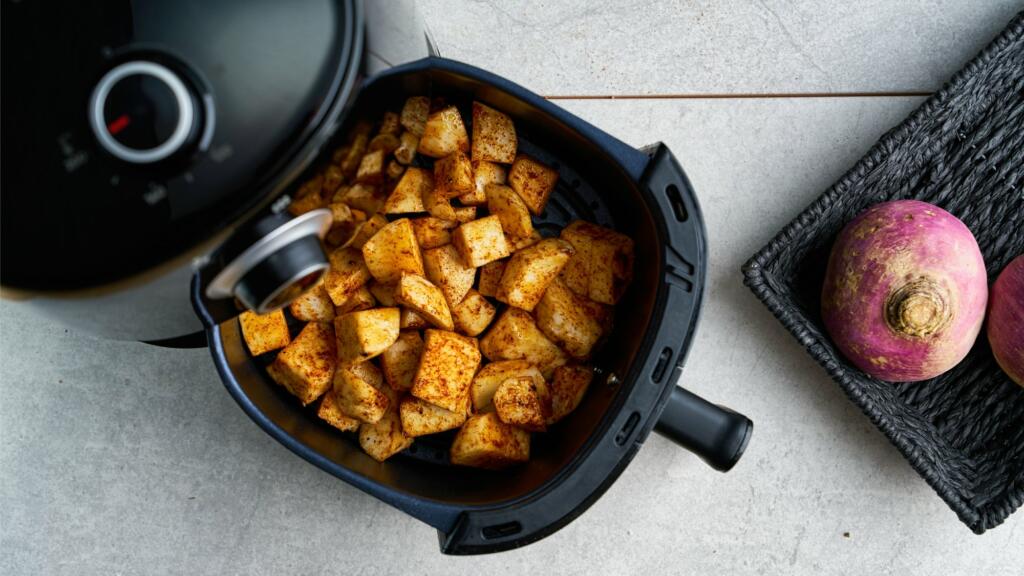
Are turnips good for you? Health benefits of this underrated root veg revealed
Gemma Harris
We dish out the truth about food groups and reveal how getting the right amount can support your health.
Want to maintain a healthy balanced diet that will support your overall health? Knowing what the food groups are and how much you need from each can help with this.
Culinary medicine expert and nutritional therapist Dr Sunni Patel says: “Eating a balanced diet consisting of all the food groups can support our health in several ways, especially as we age.”
Yet many of us aren’t reaching this. There are a whole host of different reasons for this, from having the time and motivation to prepare healthy food to having a large enough fridge or freezer. So to help tackle this, we have a guide to each of the food groups, how much you need, expert tips on how to achieve this and what health benefits you can expect.
Want to maintain a healthy balanced diet that will support your overall health? Knowing what the food groups are and how much you need from each can help with this.
Culinary medicine expert and nutritional therapist Dr Sunni Patel says: “Eating a balanced diet consisting of all the food groups can support our health in several ways, especially as we age.”
Yet many of us aren’t reaching this. There are a whole host of different reasons for this, from having the time and motivation to prepare healthy food to having a large enough fridge or freezer. So to help tackle this, we have a guide to each of the food groups, how much you need, expert tips on how to achieve this and what health benefits you can expect.
 Credit: Shutterstock / nehophoto
Credit: Shutterstock / nehophotoThe foods and drinks we consume are divided into five main groups, according to the Eatwell Guide. These are:
The amount you need from each food group is individual and can vary depending on several factors, including age, gender, body size, physical activity level and overall health status.
Patel adds: “You should also keep in mind individual preferences, cultural traditions and dietary restrictions when choosing foods.”
Below we’ll outline each of the food groups in more detail, including the recommended amounts to aim for.
“Fruits are edible products of plants and vegetables are edible parts of plants,” says Patel. “These foods are excellent sources of vitamins, minerals, fibre and phytochemicals (chemicals found in plants that protect them against bacteria, viruses and fungi).”
According to the World Health Organization, we should eat at least five portions of fruit and veg per day in total.
“The size of a portion is about 80g (just under 3oz) which is roughly how much chopped fruit or vegetables is in a handful,” shares Patel.
To help achieve this, he recommends eating at least one to two portions of different fruits and vegetables with each meal, such as a side salad, roasted veggies or a piece of fruit for dessert.
“Include a range of colourful fruits and vegetables, including leafy greens, berries, citrus fruits, cruciferous vegetables (such as broccoli and cauliflower) and sweet potatoes,” adds Patel. You can opt for either fresh, frozen, tinned, dried or juiced.
 Credit: Shutterstock/Kekyalyaynen
Credit: Shutterstock/KekyalyaynenCommon myth: Too much fruit is bad for you. It’s not true that your five a day should be made up primarily of veg. While this is correct to an extent – as you can have too much of a good thing – there’s no guidance around how your five portions should be split between fruit and vegetables. Plus, as most of us aren’t hitting our five a day, we shouldn’t worry about cutting down on fruit or veg.
These include bread, pasta, rice, breakfast cereals, oats and other grains. “They are a good source of fibre and various vitamins and minerals,” advises Patel. According to the British Nutrition Foundation, starchy foods, particularly wholegrains, are a main food group in dietary guidance worldwide.
Patel suggests that about a third of your plate should be made up of starchy carbohydrates for each meal. Another way to quantify this is a portion “about the size of your fist,” according to Sophie Medlin, a consultant dietitian and chair of the British Dietetic Association for London.
Patel advises choosing wholegrains over refined grains whenever possible, as they provide more fibre, vitamins and minerals. “Examples of wholegrains include whole wheat bread, brown rice, quinoa, oats and barley.” According to the NHS, leaving the skin on potatoes also counts.
Protein foods include meat, poultry, fish, eggs, beans, peas, nuts and seeds, says Patel. “They are rich in essential amino acids, which are the building blocks of proteins that our bodies need for growth and repair.”
A portion of protein is roughly the size of the palm of your hand, and adults need 0.75g per kg of body weight per day. This is equivalent to about two portions. “Choose lean sources of protein such as skinless poultry and fish, or a plant-based protein like tofu, tempeh, beans, lentils and nuts,” adds Patel.
You should also eat less red and processed meat like bacon, ham and sausages, according to the NHS.
More detailed advice is in place concerning fish. Official food guidelines recommend eating at least two 140g (5oz) portions a week; one of these should be oily, such as salmon, sardines or mackerel. Medlin says this helps to increase your omega-3 fatty acids levels, which are needed for various processes in the body such as blood clotting. She adds that if you find this difficult, you should consider taking an omega-3 supplement.
 Credit: Shutterstock/Tatjana Baibakova
Credit: Shutterstock/Tatjana Baibakova“Dairy includes milk, cheese, and yogurt,” says Patel. “They are good sources of calcium as well as protein and other essential nutrients.”
He recommends a serving of dairy or dairy alternatives should be included with each meal. A recommended portion of cheese with a meal is about 30g (1oz). A portion of milk or yogurt is about 200-250ml (around a third to half a pint).
“Choose dairy products such as milk, yogurt and cheese, as well as non-dairy alternatives – such as soy milk and almond milk – that are fortified with calcium and other nutrients (iodine, B vitamins and vitamin D).
The NHS says to opt for lower-fat or lower-sugar products when you can, such as semi-skimmed, skimmed or 1% fat milk, reduced-fat cheese or plain low-fat yogurt.
Oils and spreads are types of fat. “They are important sources of energy, and some fats are essential for good health,” says Patel. However, all fats are high energy sources and should be eaten in small amounts.
Patel and Medlin say to choose unsaturated fats like olive oil and rapeseed oil. Medlin also advises limiting saturated fats such as butter or ghee. Plant-based nut butters are a healthier choice that she suggests using instead.
Medlin also notes that cooking temperatures tend to be very high when using oil to fry, roast, grill or barbeque food, and that this can lead to a loss of nutrients. For this reason, it’s important to choose oils that are stable at high temperatures, such as olive oil, avocado oil and sesame oil.
What about fats and sugars?
The Eatwell Guide notes we should eat foods containing fats and sugars “less often and in small amounts”. We should also opt for foods lower in fats and sugars and avoid too much salt where possible. Fats and sugars are not included as a food group as they are not necessary in our diet to maintain our health.
Patel advises limiting saturated and trans fats found in animal products and fried and processed foods. Avocado, nuts and seeds are examples of sources of healthier fats.
Foods such as chocolate, cakes, biscuits, sugary drinks, butter and ice cream are “high in sugar and calories but low in nutrients,” warns Patel. “These should be consumed in moderation as they can increase the risk of obesity, type 2 diabetes and other health problems.” Instead, he recommends choosing “whole foods that are naturally sweet, such as fruits and sweet potatoes”.
Patel also points out that smoothies and fruit juices can be high in sugar so should be consumed in moderation.
 Credit: Shutterstock/Alter-ego
Credit: Shutterstock/Alter-egoGetting enough fluids and choosing water, where possible, is an important part of the Eatwell Guide recommendations to help keep you healthy.
Patel says: “Water is the most important drink for the body, as it is necessary for staying hydrated and maintaining bodily functions.” The Government recommends six to eight glasses (1.5-2 litres) per day.
Other fluids can also be healthy choices. “Unsweetened drinks such as coffee, tea and herbal teas are low in calories and free from added sugar and can be a good source of antioxidants and other beneficial compounds.”
Patel also says to limit sugary drinks and alcohol. The NHS advises drinking no more than 14 units of alcohol per week, spread across three days or more. This is equivalent to around six medium (175ml) glasses of wine or six pints of 4% beer.
Patel’s top tip for weight loss: “Practice portion control, if you’re trying to manage your weight. Use smaller plates and bowls and be mindful of portion sizes to avoid overeating.”
Consult a registered dietitian or healthcare professional to help determine the appropriate amount of each food group you should consume to meet your specific needs and goals.
Sophie Medlin
Consultant colorectal dietitian and director of CityDietitians
Medlin has worked with people with digestive problems for more than 10 years, in the NHS in research, in the media, and in her private practice. She is passionate about making good gut health accessible to everyone.
Dr Sunni Patel PhD, MBA, PGDip (Cul Med)
Culinary medicine and nutritional therapy expert
With more than 15 years of healthcare experience and 10 years working in senior corporate roles, Dr Patel has a passion and proven success for bringing wellness into everyday life. He is also founder of health coaching and food education platform Dish Dash Deets and has a PhD on the risk factors for type 2 diabetes and heart disease.

Written by Gemma Harris she/her
Published: Updated:
Gemma Harris has been a journalist for over seven years and is a self-confessed health and wellbeing enthusiast, which led her to specialise in health journalism. During her career, she has worked with top editors in the industry and taken on multiple high-discipline fitness challenges for certain outlets. She is particularly passionate about nutrition; after being diagnosed with irritable bowel syndrome in 2016, she discovered her fascination for gut health and founded thegutchoice.com – a dedicated space for providing a hopeful outcome for people with gut issues. Gemma’s core aim is to help others through her writing.

Gemma Harris

Ruth Tierney

Gemma Harris

Gemma Harris